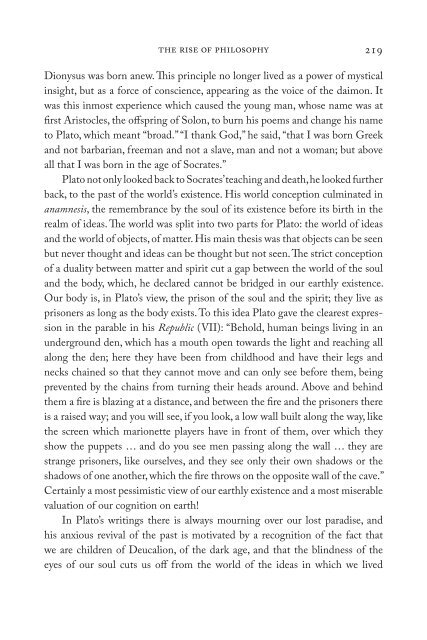The Gospel of Hellas - Research Institute for Waldorf Education
The Gospel of Hellas - Research Institute for Waldorf Education
The Gospel of Hellas - Research Institute for Waldorf Education
You also want an ePaper? Increase the reach of your titles
YUMPU automatically turns print PDFs into web optimized ePapers that Google loves.
the rise <strong>of</strong> philosophy<br />
Dionysus was born anew. This principle no longer lived as a power <strong>of</strong> mystical<br />
insight, but as a <strong>for</strong>ce <strong>of</strong> conscience, appearing as the voice <strong>of</strong> the daimon. It<br />
was this inmost experience which caused the young man, whose name was at<br />
first Aristocles, the <strong>of</strong>fspring <strong>of</strong> Solon, to burn his poems and change his name<br />
to Plato, which meant “broad.” “I thank God,” he said, “that I was born Greek<br />
and not barbarian, freeman and not a slave, man and not a woman; but above<br />
all that I was born in the age <strong>of</strong> Socrates.”<br />
Plato not only looked back to Socrates’ teaching and death, he looked further<br />
back, to the past <strong>of</strong> the world’s existence. His world conception culminated in<br />
anamnesis, the remembrance by the soul <strong>of</strong> its existence be<strong>for</strong>e its birth in the<br />
realm <strong>of</strong> ideas. <strong>The</strong> world was split into two parts <strong>for</strong> Plato: the world <strong>of</strong> ideas<br />
and the world <strong>of</strong> objects, <strong>of</strong> matter. His main thesis was that objects can be seen<br />
but never thought and ideas can be thought but not seen. <strong>The</strong> strict conception<br />
<strong>of</strong> a duality between matter and spirit cut a gap between the world <strong>of</strong> the soul<br />
and the body, which, he declared cannot be bridged in our earthly existence.<br />
Our body is, in Plato’s view, the prison <strong>of</strong> the soul and the spirit; they live as<br />
prisoners as long as the body exists. To this idea Plato gave the clearest expression<br />
in the parable in his Republic (VII): “Behold, human beings living in an<br />
underground den, which has a mouth open towards the light and reaching all<br />
along the den; here they have been from childhood and have their legs and<br />
necks chained so that they cannot move and can only see be<strong>for</strong>e them, being<br />
prevented by the chains from turning their heads around. Above and behind<br />
them a fire is blazing at a distance, and between the fire and the prisoners there<br />
is a raised way; and you will see, if you look, a low wall built along the way, like<br />
the screen which marionette players have in front <strong>of</strong> them, over which they<br />
show the puppets … and do you see men passing along the wall … they are<br />
strange prisoners, like ourselves, and they see only their own shadows or the<br />
shadows <strong>of</strong> one another, which the fire throws on the opposite wall <strong>of</strong> the cave.”<br />
Certainly a most pessimistic view <strong>of</strong> our earthly existence and a most miserable<br />
valuation <strong>of</strong> our cognition on earth!<br />
In Plato’s writings there is always mourning over our lost paradise, and<br />
his anxious revival <strong>of</strong> the past is motivated by a recognition <strong>of</strong> the fact that<br />
we are children <strong>of</strong> Deucalion, <strong>of</strong> the dark age, and that the blindness <strong>of</strong> the<br />
eyes <strong>of</strong> our soul cuts us <strong>of</strong>f from the world <strong>of</strong> the ideas in which we lived

















